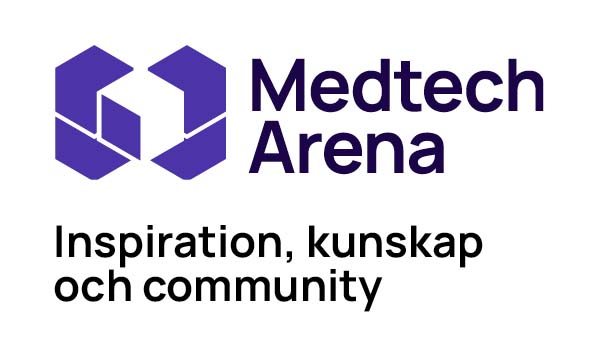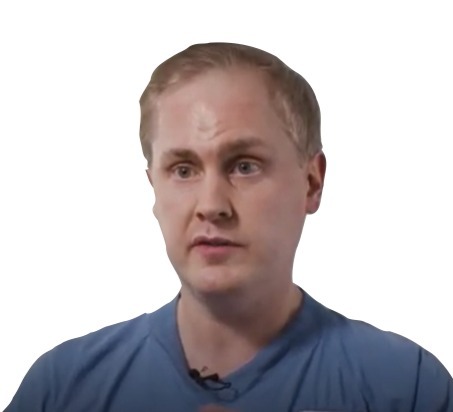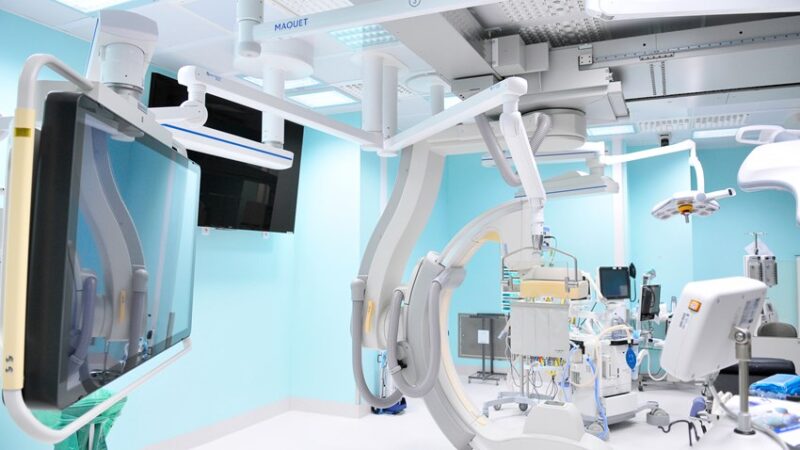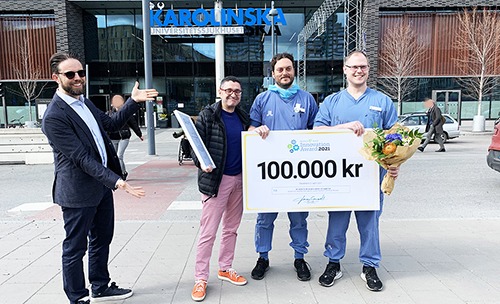
CheckutdelningLive500x300
World-leading innovation the result when neurosurgeons drive development
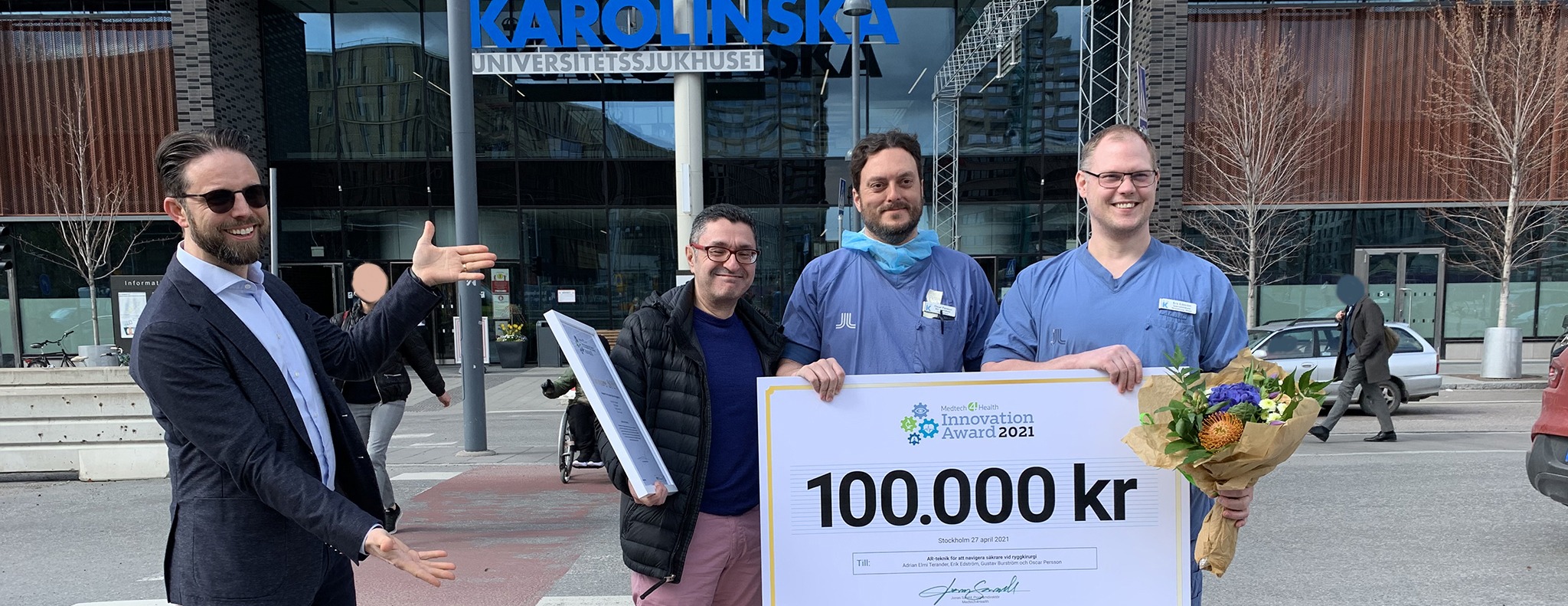
World-leading innovation the result when neurosurgeons drive development
In the spring of 2021, the Medtech4Health Innovation Award was presented to a world-leading research group consisting of four neurosurgeons at Karolinska University Hospital. Adrian Elmi Terander, Erik Edström, Gustav Burström and Oscar Persson have developed a completely new navigation technique using Augmented Reality (AR) to see exactly where in the spine a surgeon is when operating.
”The new thing about AR technology is that we can see what it looks like inside the patient as we operate,” explains Adrian Elmi Terander. ”It’s a little like being Superman and having X-ray vision. Usually when we operate, we only see the back of the patient’s vertebrae, but in front there are blood vessels and nerves, and in the middle is the spinal cord. As a surgeon, you often have a margin of error of just a few millimetres, which means there is always a risk of damaging tissues or organs. With the technology we have developed, we can increase precision, reduce the risk of errors and, above all, increase patient safety.”
”Another important aspect is that by increasing precision we will be able to help patients who we have not previously dared to operate on because the risk was too great,” says Gustav Burström.
By increasing the chance of a successful result in the first operation, the need for follow-up operations will also be reduced. This can lead to lower costs for society, but above all it can help many patients to avoid undergoing another procedure.
The technology, which has recently received CE marking and FDA approval, is already used in back surgery at Karolinska, mainly in the thoracic and lumbar spine areas. The goal is now to adapt AR technology to use in more areas to improve patient safety and precision there as well.
”We see that this as just the beginning,” says Oscar Persson. ”In the near future, we will hopefully be able to navigate with the help of AR technology in many other operations, for example in brain tumour surgery.”
Important to understand one another’s professions
As early as 2014, Adrian Elmi Terander and his colleagues saw an opportunity to use AR technology to improve the precision of spinal surgery. It all started with Associate Professor Michael Söderman at the Department of Neuroradiology mediating contact with Dr. Drazenko Babic at Philips on the development of Image Guided Therapy. An initiative that has led to a long and fruitful collaboration that is still ongoing.
”We and the engineers live in completely different worlds. As neurosurgeons, we are the ones who meet the patients and perform the operations,” says Erik Edström. ”It is we who see what needs there are and also experience the medical consequences of different solutions. The closer co-operation we and the engineers have, the better the solutions can be. We have learned to speak the same language and built an understanding of each other’s worlds. It takes some effort to create a strong multidisciplinary team, but this journey has shown us that it is extremely important to succeed!”
”Two other parties who have meant a great deal to the implementation of the project are The Centre for Innovation at Karolinska University Hospital, and Region Stockholm’s Innovation Fund,” adds Adrian Elmi Terander.
Too few hybrid theatres no obstacle in the future
Very simply, what the surgeon sees during the operation is an image from four video cameras that have been built into an X-ray detector. The live image is supplemented with three-dimensional X-ray information so that the surgeon can see both the surgical field and the hidden X-ray information at the same time. How the surgeon has planned his operation, for example placement and direction of screws in the back, can also be seen in the live image. That’s what AR means. Initially, an X-ray is performed with a rotating layer X-ray arc that moves around the patient. Since both X-rays and video cameras are in the same device, a very precise match can be achieved with the help of small markers on the surface of the skin. This requires specially built X-ray equipment at the operating table, which is currently only available in hybrid operating theatres.
”What distinguishes a hybrid theatre from a normal operating theatre is that you have a sterile operating environment and equipment as well as advanced X-ray equipment in the same room,” Erik Edström explains. ”This means that you do not have to move the patient when taking X-rays, to see, for example, if you have removed the entire tumour or placed your screws correctly. The fact that we can see the result before we close the incision leads to significantly fewer repeate procedures, which is both safer for the patients and reduces ultimate cost to the hospital and to society in general.”
But hybrid operating theatres are expensive to build, equip and operate, and a large amount of space is required – something that has led to only a few at the largest hospitals.
”Though not all neurosurgeons around the country have access to hybrid theatres today, we want the technology to be available to all patients,” says Oscar Persson.
In the future, the research group would like to see a mobile AR solution – perhaps based on AR glasses – that can be used even in smaller clinics without access to hybrid theatres and the other equipment necessary for AR navigation today.
”Yes, we believe that in a few years, AR navigation will be standard both in spinal surgery and in other forms of neurosurgery,” concludes Adrian Elmi Terander. ”The trend is that patients are becoming more and more well-informed and demand to receive the best care available. And today, AR navigation is the best navigation technology we have!”
Winning the award a good example
”This project is a particularly good example healthcare actively participating in the development and introduction of new technology,” says Jonas Sareld, Programme Director at Medtech4Health. ”The AR technology that these researchers have developed and implemented at Karolinska University Hospital has led to significant improvements in patient safety in back surgery, and is already used around the world. It is with great pride and pleasure that we present this year’s prize to Adrian Elmi Terander, Erik Edström, Gustav Burström and Oscar Persson.
The Medtech4Health Innovation Award is a prize awarded by Medtech4Health with the aim of drawing attention to the good role models that exist in healthcare when it comes to implementing medical technology in everyday life. The award also aims to provide support in the continued work of disseminating the knowledge/technology/model that has been developed. The nomination for next year’s Innovation Award opens on 1st September, but you can already order a reminder e-mail using the link below. You are welcome to nominate your colleagues, or your own project.
See the film of the award ceremony here
See a video presentation of the winning entry
Nominate your colleagues or yourself for the Medtech4Health Innovation Award 2022
Translated from the original Swedish here: https://medtech4health.se/varldsledande-innovation/
NEWS
Medtech4Health Innovation Award firar tio år! Nu är det dags att nominera ditt bidrag
I tio år har Medtech4Health hyllat framgångsrika medicintekniska projekt som gör skillnad i vård och omsorg. Priset lyfter fram förebilder som visar hur medicinteknik kan implementeras i vardagen och förbättra livet för personal, patienter och anhöriga.
Finansieringsglapp lämnar små och medelstora företag utan stöd
Medtech4Health och Swelife har tillsammans finansierat över 200 projekt genom utlysningen ”Samverkansprojekt för bättre hälsa”. Syftet har varit att accelerera utveckling och kommersialisering av innovativa lösningar för vård och hälsa. Resultatet talar sitt tydliga språk – tillväxten hos de finansierade företagen har ökat kraftigt.
Happy Summer Wishes from Medtech4Health
After an intense spring, it's almost time for a well-deserved summer break. But first, we look forward to meeting you in Almedalen, where we are part of the Tillsammans meeting place.
Medtech4Health on Tour: MedTech Forum Comes to Stockholm in 2026
This year, The MedTech Forum 2025 was held in Lisbon. Around 1,000 participants gathered at Europe’s largest health and medical technology conference for three days of insightful discussions on the sustainable future of healthcare in Europe.
NEWSLETTER
Följ nyheter och utlysningar från Medtech4Health – prenumera på vårt nyhetsbrev.
AKTUELLT
Finansieringsglapp lämnar små och medelstora företag utan stöd
Medtech4Health och Swelife har tillsammans finansierat över 200 projekt genom utlysningen ”Samverkansprojekt för bättre hälsa”. Syftet har varit att accelerera utveckling och kommersialisering av innovativa lösningar för vård och hälsa. Resultatet talar sitt tydliga språk – tillväxten hos de finansierade företagen har ökat kraftigt.
Glad sommar önskar vi från Medtech4Health
Efter en intensiv vår är det snart dags för en välbehövlig sommarpaus. Men först ser vi fram emot att ses i Almedalen där vi är en del av mötesplatsen Tillsammans.
SO Västra stärker innovationskraften genom samverkan och erfarenhetsutbyte
Medtech4Healths nod SO Västra har gjort programmet till en naturlig del av innovationsarbetet i Västra Götaland. Här finns en stark samverkan där metoder och erfarenheter delas framgångsrikt.
Nytt verktyg ska bana vägen för smidigare breddinförande av medicinteknik
Först ut från Medtech4Healths strategiska projekt MedImpact är ett instrument för enklare breddinförande av teknik för egenmonitorering. Med instrumentets frågebatteri blir det möjligt att undvika fallgroparna vid ett breddinförande. Instrumentet finns på Medtech Arena.
NYHETSBREV
Följ nyheter och utlysningar från Medtech4Health - prenumera på vårt nyhetsbrev.

